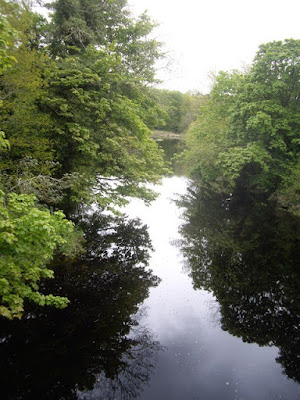After the siege of Caerlaverock in July 1300 the English moved west, along the southern Galloway coast. King Edward’s probable intention was to hunt down the Earl of Buchan, who held Cruggleton on the western banks of the Cree. Buchan was known to be in the area, trying to persuade those Gallovidians who supported Edward to switch to the Scots. The capture of Caerlaverock had strengthened the king’s hold over Galloway, and defeating Buchan would remove another threat.
Buchan seems to have tracked the progress of the English army. All he had to do was wait, as the English infantry were deserting in large numbers; of the 9000 who had originally mustered at Carlisle on 1 July, barely 4500 remained with the king by mid-August. There were no military police in the thirteenth century, and Edward had no means of preventing his footsoldiers from running off home.
Buchan was emboldened enough to go on the offensive. Between 6-9 August a number of skirmishes were fought at the mouth of the river Fleet, where the English men-at-arms were presumably foraging for supplies. Among them was a young Gascon squire named Piers Gaveston, who lost his horse in the fighting. Otherwise these tentative forays were a disaster for the Scots; the marshal of Scotland, Sir Robert Keith, was captured along with Sir Thomas Soules, Robert Barde, William Charteris and Laurence Ramsay. These men, described by the king as some of his “worst enemies”, were sent off to prison in England. Robert Barde in particular was a useful catch, since he and his seven brothers had been wreaking havoc in the Marches.
The Scots then tried a stratagem. One of Buchan’s men approached an English earl and pretended to have deserted the Scots. The earl (which one isn’t stated) gave him command of two hundred soldiers, whom the Scot led into an ambush. Some of the English were killed, but the survivors managed to flee back to the king. Edward immediately sent out more men, who attacked the pursuing Scots and chased them off. According to Rishanger, Buchan’s men were ‘inebriati’, which can mean drunk or light-headed; possibly both. If they had been hitting the booze, that might explain the failure of the ambush.
Despite his victory, Edward was in no mood to celebrate:
“…the losses of the day distressed the king's heart, as what he had hoped for only barely succeeded.”*
The Scottish spy can possibly be identified as one Robert Skort, who was delivered from gaol in Cumberland on 9 September. Skort was described as a Scotsman who had come to the king’s peace on three occasions, and each time defected back to the Scots with information on the state of England. The jury found that he was a spy, but Skort was recommitted to gaol until the king was consulted. At the next gaol delivery, on 7 March 1300, Skort was found guilty of ‘divers robberies’ and hanged.
*Thanks to Rich Price for the translation from Rishanger.


No comments:
Post a Comment